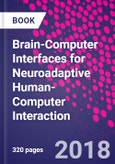Brain-Computer Interfaces for Neuroadaptive Human-Computer Interaction provides comprehensive and rigorous coverage of human-computer interaction (HCI), psychology, neuroscience, engineering, and brain-computer interfaces (BCI). This leading-edge book provides researchers in the field with an understanding of the relevance and application of BCI methods and solutions in the context of HCI and human-machine systems. BrainComputer Interface provides readers with a broad survey of relevant themes, as well as comprehension of the underlying concepts.
Furthermore, the book provides fundamental skills necessary to design and set up experiments, and evaluate the results. To this end, the book comprises theoretical sections, as well as explicit instructions, discussions of important questions, summaries, and exercises. Specific points are illustrated using examples of actual experiments and applications, and coverage includes neurophysiological concepts that are relevant to BCI, a history of BCI ideas, methods, and research, fundamentals of experimental BCI research and design, the why and how of applying BCI in HCI contexts, as well as signal processing and machine learning methods using open-source toolboxes.
- Provides examples of actual experiments and applications using human-computer interaction (HCI)
- Covers neurological concepts relevant to BCI history, ideas, methods, and research, including why and how to apply BCI in HCI contexts
- Includes signal processing and machine learning methods using open-source toolboxes
Table of Contents
Part I. Building up a theoretical background for Brain-Computer Interface-based applications in Human-Machine Systems 1. Human-Machine Systems 2. Brain-Computer Interfacing in a nutshell 2.1. BCI research 3. An overview of current research in the field of BCI 4. Neuroscientific Background 5. Techniques from Signal Processing and Machine Learning 6. A broadened approach to Brain-Computer Interfaces
Part II. Studies on passive BCIs 7. Benchmarking classification schemes for movement related brain activity 8. A passive BCI for detecting perceived loss of control 9. A passive BCI for automated adaptation based on error responses
Part III. Studies on the optimization of applicability of current BCI systems 10. A hybrid BCI combining gaze and BCI control for touchless HMI 11. A validation study of dry electrodes
Part IV. Discussion, Conclusions and Outlook 12. Discussion 13. Conclusions 14. Outlook
Authors
Zander, Thorsten Dr. Thorsten Zander took a degree in Mathematics at the Westfalische Wilhelms-Universitat, Munster, Germany, and his doctorate at the Institute of Human-Machine-Systems at Technical University Berlin, before embarking on a distinguished career at various research institutions, including Affiliated Research Scientist at the Institute for Knowledge at Technical University Graz, Austria, Project Leader at Max-Planck-Institute for Intelligent Systems, and ongoing habilitation process in the Department of Psychology and Ergonomics at Technical University Berlin. Dr. Zander is currently Group Leader in the Department of Biological Psychology and Neuroergonomics at Technical University Berlin and Associated Project Research Scientist in the Cognitive Science Department at University of California San Diego (UCSD). Dr. Zander is also an International Affiliate of the Learning, Educational Achievement, and Life Course Development (LEAD) excellence graduate school at the University of Tuebingen, Germany. Dr. Zander has been active in development and partnership with industry, including foundation and leadership of Zander Laboratories B.V., Scientific Advisor at Eagle Science B.V., Scientific Advisor at Brain Vision LLC, and Scientific Advisor at Brain Products.In addition, Dr. Zander also has many scientific achievements, including definition and validation of Passive Brain-Computer-Interfaces, foundation and leadership of the Community for Passive BCI Research, foundation and leadership of the Team PhyPA working group at Technical University Berlin, and co-foundation of Implicit Human-Technology Interaction Ruben Krol, Laurens








